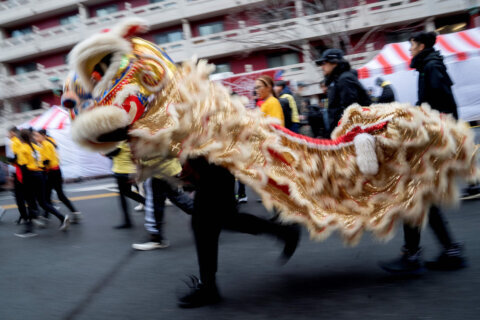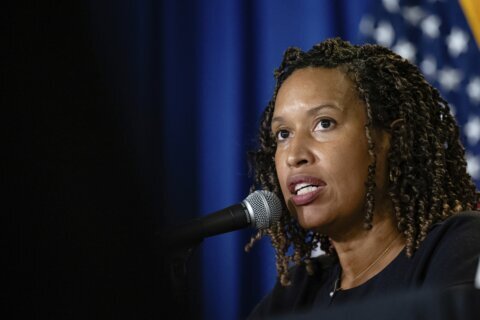Thousands of people from coalitions of civil right, human rights and labor rights leaders are expected to attend rallies and protests in D.C. this weekend for the 58th anniversary of the March on Washington.
Marches also will be held in Atlanta, Miami, Houston and Phoenix.
Here’s what you need to know.
- Q:
What are the events happening in D.C. Saturday?
- A:
There are a few. The biggest is Rev. Al Sharpton’s March On for Voting Rights. Tens of thousands are expected to attend. There will also be a closing rally.
There’s also the Douglass Commonwealth’s Dream March, which includes a “Make Good Trouble” demonstration; a D.C. statehood, green jobs and justice rally; and a march called “Every Case Matters” that will deliver a petition to the Justice Department.
A key focus this weekend is voting rights and demonstrators will urge passage of federal voter protections eroded since the Voting Rights Act of 1965.
- Q:
When are the events?
- A:
March on Washington
- 8 a.m.: Gathering at McPherson Square Park at 15th Street NW and H Street NW
- 9:45 a.m.: March kicks off from McPherson Square past Black Lives Matter Plaza, passing the White House and Washington Monument.
- 11:30 a.m. to 3 p.m.: Closing rally with the backdrop of the National Mall, entering at 12th Street and Madison Drive, gathering from 7th Street to 14th Street between Jefferson Drive and Madison Drive.
Dream March
- 7 a.m.: Every Case Matters petition delivery to the Justice Department, then a march to Freedom Plaza.
- 8:30 a.m. to 10 a.m.: Make Good Trouble rally at Freedom Plaza.
- 10:30 a.m. to 11 a.m.: Good Trouble rally at the Lincoln Memorial.
- 11 a.m. to 3:30 a.m.” D.C. statehood, green jobs and justice rally at the Lincoln Memorial.
- Q:
Are there COVID-19 safety protocols?
- A:
With the delta variant of the coronavirus currently spreading across the U.S., including in D.C. where transmission of the virus is considered high, organizers of the March on Washington say they are encouraging — but not mandating — attendees wear face masks.
“At every march, we strongly encourage physical distancing as much as possible, masking indoors in alignment with CDC guidelines and recommendations, masking outside when physical distancing is not feasible, and vaccination for all those who are eligible,” organizers wrote on the website.
- Q:
Will there be road closures?
- A:
Yes.
The following streets will be closed from 6 a.m. until 4 p.m.:
- 14th Street from Constitution Avenue to Independence Avenue SW
- 7th Street from Constitution Avenue to Independence Avenue SW
- Jefferson Drive, SW from 3rd Street to 15th Street SW
- Madison Drive, SW from 3rd Street to 15th Street SW
- 12th Street Tunnel
While D.C. police said there is the potential for intermittent street closures in the downtown area, it does not anticipate that.
More details are available from WTOP.
- Listen to WTOP online and on the radio at 103.5 FM or 107.7 FM.
- Current traffic conditions
- Sign up for WTOP alerts
- Read more WTOP transportation news
- Q:
Who’s speaking at the March on Washington?
- A:
The list of speakers, first shared with The Associated Press, includes Reps. Joyce Beatty, Terri Sewell, Sheila Jackson Lee and Mondaire Jones, along with civil rights attorney Benjamin Crump, the family of George Floyd, and American Federation of Teachers president Randi Weingarten.
- Q:
What is the fight over voting rights?
- A:
Broadly speaking, Sharpton’s march and those in dozens of other cities, including Atlanta, Houston, Miami and Phoenix, cap a week of actions against a wave of proposals in conservative-leaning states to curb access to early voting, mail-in vote casting and ballot drop boxes used in pandemic-era elections.
Advocates say it’s a reaction to shifting racial demographics, made clear in recently released 2020 census data, and a corresponding shift in the balance of power between the white majority and Black and Latino people, as well as rapidly growing Asian communities.
Prominent Republicans, who have criticized the Democratic proposals as a power grab, say they aren’t opposed to election laws that expand voter access. And many of them support proposals to build trust among Americans who believe, albeit falsely, that the last presidential election was stolen from former President Donald Trump and other GOP candidates due to widespread voter fraud.
- Q:
What are the proposals in Congress?
- A:
The Democratic proposals include the John Lewis Voter Advancement Act, which would restore and strengthen the weakened 1965 law and add protections against suppression tactics affecting Indigenous communities. The separate For the People Act would create a national standard for voter registration, mail-in balloting and early voting, as well as curb racial gerrymandering and institute campaign finance reforms.
Meanwhile, a wave of Republican-backed state initiatives could disproportionately disenfranchise voters of color at a time when they have turned out at the polls at historically high levels in states like Georgia and Missouri, said Carmen Perez, president and CEO of The Gathering for Justice, a nonprofit founded by legendary musician and activist Harry Belafonte.
- Q:
How are voting rights being suppressed?
- A:
According to the Brennan Center for Justice, which tracks laws restricting voter access, between January and mid-July, at least 18 states enacted 30 suppressive laws.
More than 400 bills with rules that reduce mail-in voting access, ballot drop boxes and other restrictions were introduced in 49 states this year.
A full report is available online.
The Associated Press contributed to this report.








